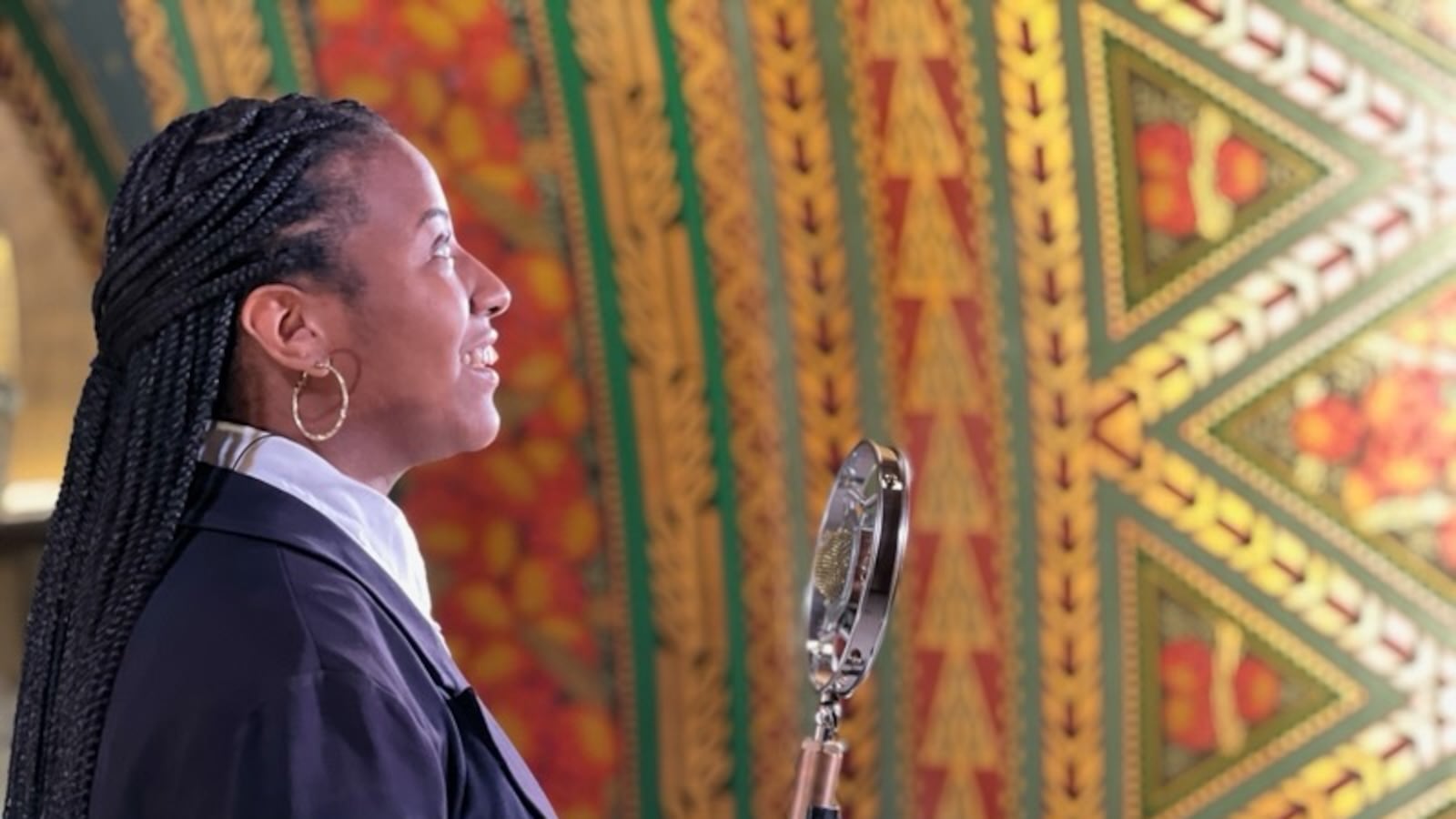The stage lights were warm on my skin, and the sound from the microphone clipped to my shirt reverberated around the theater. As I recited my lines, I looked out at the crowd. High schoolers are harsh critics, and I was nervous to be in front of so many teenagers I didn’t know. Glancing out, I wondered if any of those students looking back at me were experiencing the same situation I was describing in my poem:
“They don’t know what it’s like to not have a roof over my head, but always have walls built up around me.”

It was September 2023, and I was reading a poem I’d written, “Andy’s Attic,” as part of a play put on by Teen Hype, a youth development program in Detroit. The group’s student organizers curated a performance that explored social issues, and they’d asked me to write and recite a piece about housing insecurity.
As a homeless teenager myself, I was initially concerned that the piece would hit too close to home. My parents had lost the house in January of that same year. I was embarrassed about my still-uncertain housing status. Once I started writing, however, I would find that telling my story through poetry could be emotionally healing.
When I finished reciting my piece, silence fell over the crowd. Suddenly, a boy in the audience called out, “Yo, that was fire!” The theater erupted into applause as I walked offstage.
As the play continued, I couldn’t keep a proud smile off my face. I felt like I had released some of the shame I experienced because of my family’s circumstances. And maybe I had helped others in the process.
Late that night, I returned with flowers and cupcakes to the house where I had been staying. My siblings and younger cousins were already upstairs sleeping, so I quietly placed my things into a corner. For some time, I sat silently at the kitchen table reflecting on everything I had been through for the past nine months, following the eviction.
For me, all of 2023 was a blur. It was right in the middle of my sophomore year — January 17 to be exact — when my family was evicted from our house. For months, I stayed with my cousins during the school week and with either my aunt or my grandparents on weekends. There were often last-minute schedule changes that involved stuffing backpacks full of clothes as quickly as possible and rushing out the door.
With our eviction, I became one of nearly 1.4 million students in America who experience homelessness during the school year — a staggering statistic. Michigan, where I live, is home to more than 35,000 homeless students, with many of them residing in Detroit.
In many cases, families aren’t aware that their situation can be described as homelessness, since they are not sleeping outdoors. But homelessness also refers to the kind of displacement I experienced, like doubling up with family members. Other homeless families live temporarily in shelters, hotels, or motels, or reside in a vehicle. Families in these situations don’t necessarily know that the federal McKinney-Vento Homeless Assistance Act entitles them to transportation to and from school, free uniforms, and various other support services.
Moving from place to place was very disruptive to my sleep schedule and took a toll on my mental health. At times, I would start crying inconsolably in a bathroom stall, and other times, I would grow irritated by the smallest inconveniences. Once at school, a friend cracked a joke about my shoes always being untied. Everyone around us laughed good-naturedly, but I glared at her. “Sorry,” she immediately apologized. “I didn’t know you would take it so seriously.” It wasn’t a big deal, but I was under so much constant pressure that even harmless jokes would trigger intense emotions.
Homelessness has meant seeing mice in the places I was sleeping, wearing the same uniform for a week, and falling asleep in the middle of class. It has meant loss, pain, confusion, and fatigue.
It has also meant resilience.
It wasn’t easy at all, but thanks to empathetic teachers — and my own stubborn determination — I received academic honors every year. I maintained a 5.0 grade point average, taking advanced courses and participating in the National Honor Society. Although the fatigue from my circumstances led me to procrastinate, I did my best to concentrate on my studies.
I also thrived in my after-school activities. The free meals and a building to spend some extra hours in made these programs safe havens for me. I even became president of my school’s student youth advisory council as well as a leader of the robotics team. Staying committed to my passions also gave me a sense of control and a positive outlet for difficult emotions. The consistent hours and program expectations provided stability during a chaotic and uncertain time of my life.
Housing insecurity has been shown to have a drastic impact on a child’s education, often leading to increased chronic absenteeism and lower graduation rates. I understand how homelessness makes it harder for students to thrive in school. But I also know that having a supportive community can make a big difference.
Once, my Advanced Placement U.S. History teacher gave me an unexpected extension on some of my assignments. I hadn’t asked for it, but the struggle to keep up with my assignments was increasingly obvious. “You just seem like you need time,” she told me. It didn’t sound like pity but rather genuine understanding. I believe that her compassion is what helped me pass with an A and receive college credit in her class.
Another time, a friend of mine at our after-school theater program, Mosaic Youth Theatre of Detroit, brought me nuggets from Wendy’s. He hadn’t known about the hunger I was experiencing or the pressure that I was under. “I just thought about you and wanted to bring you something,” he remarked. It wasn’t anything major, but the gesture helped get me through the day, and I still think about it sometimes.
Even now, as I am preparing to begin college, my housing remains uncertain. I’m hoping that the independence and relative stability of living on campus next school year will enable me to flourish. Although I am still nervous about budgeting, I know that I can achieve anything I put my mind to.
I am proud of the work I have done. And I want people to know that with the right support, students experiencing homelessness can navigate and grow from even the most challenging circumstances. These are circumstances we should never have to endure, but are all too common in the U.S.
Charisma Holly, a 2024-25 Student Voices fellow, is a young writer born and raised in Detroit. She creates stories, plays, poetry, and other forms of writing. Charisma writes to be an inspiration to her community and to share her voice with the world around her.


